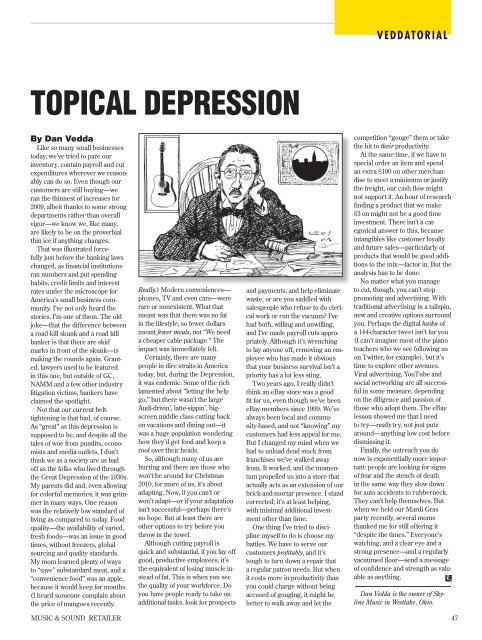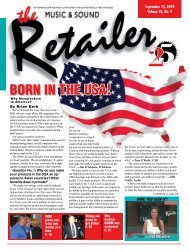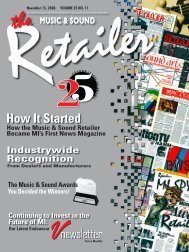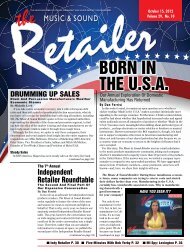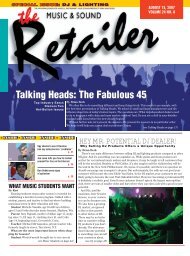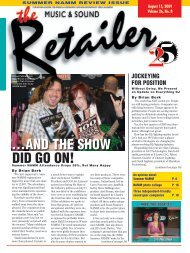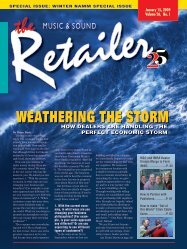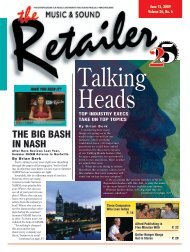laTeST - Music & Sound Retailer
laTeST - Music & Sound Retailer
laTeST - Music & Sound Retailer
You also want an ePaper? Increase the reach of your titles
YUMPU automatically turns print PDFs into web optimized ePapers that Google loves.
veddatorial<br />
Topical Depression<br />
By Dan Vedda<br />
Like so many small businesses<br />
today, we’ve tried to pare our<br />
inventory, contain payroll and cut<br />
expenditures wherever we reasonably<br />
can do so. Even though our<br />
customers are still buying—we<br />
ran the thinnest of increases for<br />
2009, albeit thanks to some strong<br />
departments rather than overall<br />
vigor—we know we, like many,<br />
are likely to be on the proverbial<br />
thin ice if anything changes.<br />
That was illustrated forcefully<br />
just before the banking laws<br />
changed, as financial institutions<br />
ran numbers and put spending<br />
habits, credit limits and interest<br />
rates under the microscope for<br />
America’s small business community.<br />
I’ve not only heard the<br />
stories, I’m one of them. The old<br />
joke—that the difference between<br />
a road kill skunk and a road kill<br />
banker is that there are skid<br />
marks in front of the skunk—is<br />
making the rounds again. Granted,<br />
lawyers used to be featured<br />
in this one, but outside of GC,<br />
NAMM and a few other industry<br />
litigation victims, bankers have<br />
claimed the spotlight.<br />
Not that our current belttightening<br />
is that bad, of course.<br />
As “great” as this depression is<br />
supposed to be, and despite all the<br />
tales of woe from pundits, economists<br />
and media outlets, I don’t<br />
think we as a society are as bad<br />
off as the folks who lived through<br />
the Great Depression of the 1930s.<br />
My parents did and, even allowing<br />
for colorful memories, it was grimmer<br />
in many ways. One reason<br />
was the relatively low standard of<br />
living as compared to today. Food<br />
quality—the availability of varied,<br />
fresh foods—was an issue in good<br />
times, without freezers, global<br />
sourcing and quality standards.<br />
My mom learned plenty of ways<br />
to “save” substandard meat, and a<br />
“convenience food” was an apple,<br />
because it would keep for months.<br />
(I heard someone complain about<br />
the price of mangoes recently.<br />
Really.) Modern conveniences—<br />
phones, TV and even cars—were<br />
rare or nonexistent. What that<br />
meant was that there was no fat<br />
in the lifestyle, so fewer dollars<br />
meant fewer meals, not “We need<br />
a cheaper cable package.” The<br />
impact was immediately felt.<br />
Certainly, there are many<br />
people in dire straits in America<br />
today, but, during the Depression,<br />
it was endemic. Some of the rich<br />
lamented about “letting the help<br />
go,” but there wasn’t the large<br />
Audi-drivin’, latte-sippin’, bigscreen<br />
middle class cutting back<br />
on vacations and dining out—it<br />
was a huge population wondering<br />
how they’d get food and keep a<br />
roof over their heads.<br />
So, although many of us are<br />
hurting and there are those who<br />
won’t be around for Christmas<br />
2010, for more of us, it’s about<br />
adapting. Now, if you can’t or<br />
won’t adapt—or if your adaptation<br />
isn’t successful—perhaps there’s<br />
no hope. But at least there are<br />
other options to try before you<br />
throw in the towel.<br />
Although cutting payroll is<br />
quick and substantial, if you lay off<br />
good, productive employees, it’s<br />
the equivalent of losing muscle instead<br />
of fat. This is when you see<br />
the quality of your workforce. Do<br />
you have people ready to take on<br />
additional tasks, look for prospects<br />
and payments, and help eliminate<br />
waste, or are you saddled with<br />
salespeople who refuse to do clerical<br />
work or run the vacuum? I’ve<br />
had both, willing and unwilling,<br />
and I’ve made payroll cuts appropriately.<br />
Although it’s wrenching<br />
to lay anyone off, removing an employee<br />
who has made it obvious<br />
that your business survival isn’t a<br />
priority has a lot less sting.<br />
Two years ago, I really didn’t<br />
think an eBay store was a good<br />
fit for us, even though we’ve been<br />
eBay members since 1999. We’ve<br />
always been local and community-based,<br />
and not “knowing” my<br />
customers had less appeal for me.<br />
But I changed my mind when we<br />
had to unload dead stock from<br />
franchises we’ve walked away<br />
from. It worked, and the momentum<br />
propelled us into a store that<br />
actually acts as an extension of our<br />
brick-and-mortar presence. I stand<br />
corrected; it’s at least helping,<br />
with minimal additional investment<br />
other than time.<br />
One thing I’ve tried to discipline<br />
myself to do is choose my<br />
battles. We have to serve our<br />
customers profitably, and it’s<br />
tough to turn down a repair that<br />
a regular patron needs. But when<br />
it costs more in productivity than<br />
you could charge without being<br />
accused of gouging, it might be<br />
better to walk away and let the<br />
competition “gouge” them or take<br />
the hit to their productivity.<br />
At the same time, if we have to<br />
special order an item and spend<br />
an extra $100 on other merchandise<br />
to meet a minimum or justify<br />
the freight, our cash flow might<br />
not support it. An hour of research<br />
finding a product that we make<br />
$3 on might not be a good time<br />
investment. There isn’t a categorical<br />
answer to this, because<br />
intangibles like customer loyalty<br />
and future sales—particularly of<br />
products that would be good additions<br />
to the mix—factor in. But the<br />
analysis has to be done.<br />
No matter what you manage<br />
to cut, though, you can’t stop<br />
promoting and advertising. With<br />
traditional advertising in a tailspin,<br />
new and creative options surround<br />
you. Perhaps the digital haiku of<br />
a 144-character tweet isn’t for you<br />
(I can’t imagine most of the piano<br />
teachers who we see following us<br />
on Twitter, for example), but it’s<br />
time to explore other avenues.<br />
Viral advertising, YouTube and<br />
social networking are all successful<br />
in some measure, depending<br />
on the diligence and passion of<br />
those who adopt them. The eBay<br />
lesson showed me that I need<br />
to try—really try, not just putz<br />
around—anything low cost before<br />
dismissing it.<br />
Finally, the outreach you do<br />
now is exponentially more important:<br />
people are looking for signs<br />
of fear and the stench of death<br />
in the same way they slow down<br />
for auto accidents to rubberneck.<br />
They can’t help themselves. But<br />
when we held our Mardi Gras<br />
party recently, several moms<br />
thanked me for still offering it<br />
“despite the times.” Everyone’s<br />
watching, and a clear eye and a<br />
strong presence—and a regularly<br />
vacuumed floor—send a message<br />
of confidence and strength as valuable<br />
as anything.<br />
Dan Vedda is the owner of Skyline<br />
<strong>Music</strong> in Westlake, Ohio.<br />
<strong>Music</strong> & <strong>Sound</strong> <strong>Retailer</strong> 47


